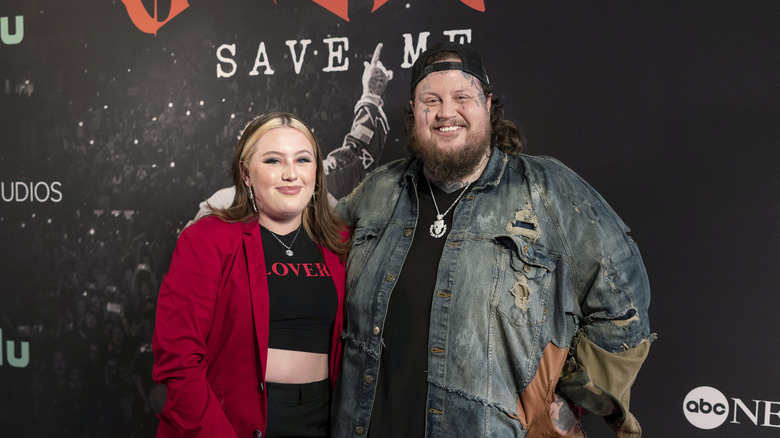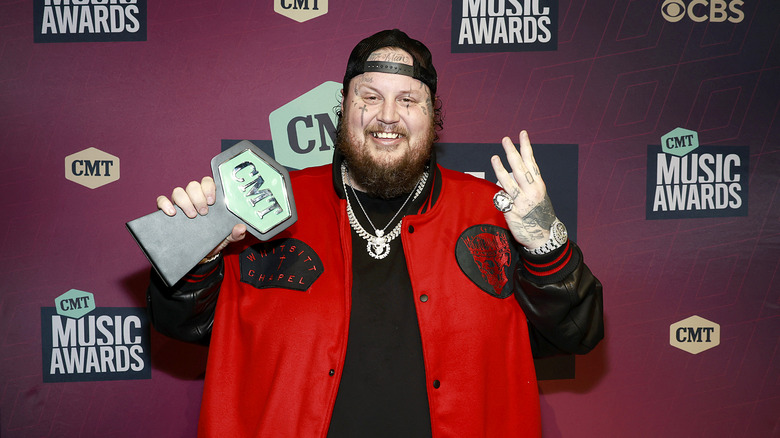How Jelly Roll Overcame A Rocky Start To His Music Career
To many fans, Jelly Roll's ascent to stardom appeared almost instantaneous. In 2023, merely a year following his major breakthrough, he broke the record for the most weeks spent at No. 1 on Billboard's Emerging Artists chart. That same year, he beat out some of the biggest names in country music, including Morgan Wallen and Luke Combs, by winning accolades at award shows such as the People's Choice Country Music Awards and the CMT Music Awards. While his success seemed to have occurred in the blink of an eye, what happened was the opposite.
Jelly Roll had a rough childhood. His father worked to make ends meet as a meat wholesaler, while his mother grappled with substance abuse issues. He started writing raps at a young age after he saw how music impacted his mom. "I just remember thinking, 'I want to make music that makes people feel like this music makes my mother feel,'" he shared in an interview on "The Bobby Jones Show." But by age 13, his parents split, and he resorted to selling drugs to try and support his mom. A year later, he was arrested for the first time, which then turned into multiple stints in juvenile centers and adult prisons in the years since for various charges, including aggravated robbery and drug dealing. At one point, he was almost slapped with a 20-year sentence. "They were talking about giving me more time than I'd been alive," he told Billboard.
But in 2008, Jelly Roll faced a turning point. While incarcerated, he received the life-changing news of the birth of his daughter, Bailee. It prompted an immediate shift, inspiring him to change for the better.
The birth of his daughter inspired Jelly Roll to turn his life around
Jelly Roll still remembers the day clearly. It was May 22, 2008, when a prison guard visited him in his cell to inform him that his daughter had been born. He was serving time for drug dealing then and resolved to turn back from a dead end. "In that exact moment sitting there uncertain about the future, I knew that if given a second chance (technically a sixth chance at that point of my life) I would get out of jail and do everything I could to be there for her," he wrote in a Facebook post dedicated to Bailee.
The country star immediately sprung into action and set his sights on obtaining his GED, a goal he achieved remarkably on his first attempt. "I spent less than 60 to 70 days in high school. I thought I was a real dumbass. I thought I was learning disabled," he told Billboard. "I walked in there and smacked that b**** out of the park."
Jelly Roll didn't walk free from prison until Bailee was two years old, and since then, he has tried to make a living through music, initially focusing on hip-hop. His career took a turn when rapper Lil Wyte, who would become one of his closest friends, recognized Jelly Roll's his singing talent. "I'll never forget Wyte looking at me and going: 'That's what you need to do,'" he told HipHopDX. He then dabbled in singing, eventually discovering that his forte was rock and country.
He's now dedicated to making an impact on the lives of others
Jelly Roll's pivot to country proved to be a success, with the "Need a Favor" crooner signing with a major label and releasing songs and albums that soared up on the charts. Soon enough, he found himself bagging nominations and awards left and right. "It was the nod of approval I prayed for," he told ET. "I knew that we were selling tickets, I knew that fans were with us, I knew that we had people that were getting moved by the music, but I wasn't really sure what Nashville thought of me, you know? ... For me, it was really like, you know, I'm welcome here and it was really cool."
But Jelly Roll's work doesn't revolve around just music. He's dedicated to helping underprivileged communities, especially kids in challenging situations akin to those he experienced in his youth. "I'm going to build halfway houses and transitional centers — that's my real heart," he shared with The New York Times. "I just never forget being that kid. Those years in juvenile were so formative, and it was so devastating for me to miss that time. On my 16th birthday, I didn't get a car; I woke up incarcerated ... I just missed so much of life. So I want to be remembered as a guy that did something for the kids in this town."



